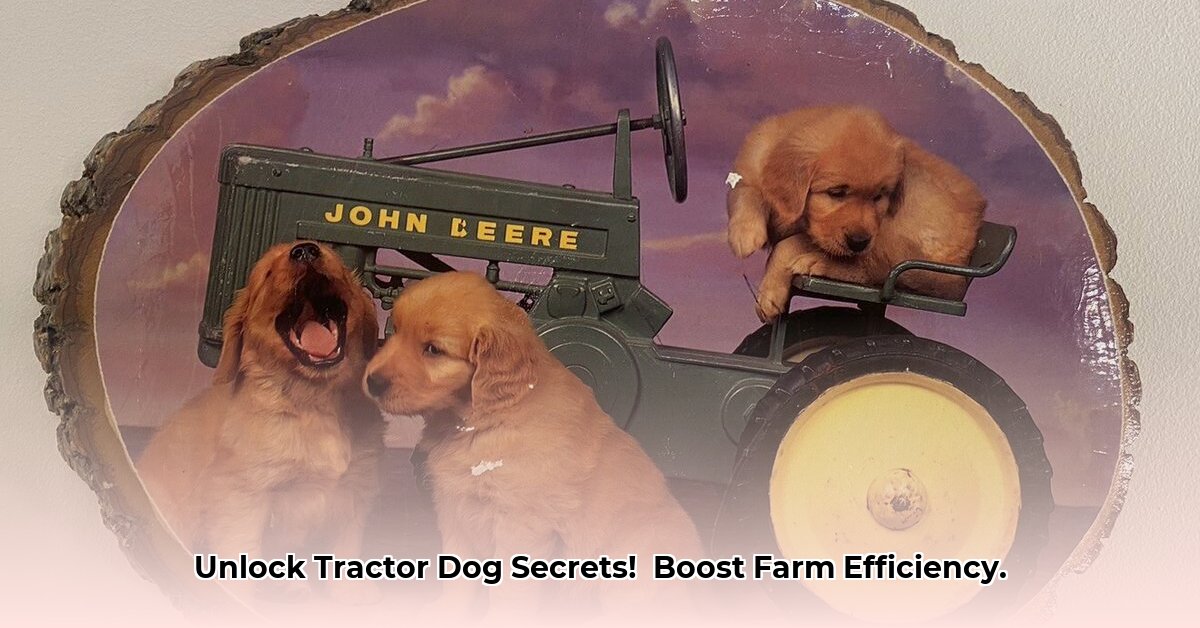
Tractor Dogs: More Than Just a Cute Name
The term "tractor dog" might conjure images of a canine piloting farm machinery, but the reality is far more nuanced and impactful. It represents the vital, often overlooked, contributions of dogs to modern, sustainable farming practices. While a dog won't be operating a tractor, their contributions enhance efficiency and sustainability. This isn't just a whimsical notion; it's about leveraging canine capabilities to create a more productive and eco-friendly farm. Are you ready to unlock the potential of your furry farmhand? For durable dog crates, check out this resource.
The Real Role of Farm Dogs: Beyond the Tractor
Forget fanciful images; let's explore the practical benefits. Well-trained dogs offer significant advantages: herding livestock, guarding against predators, retrieving tools—all tasks saving time and energy. This isn't about replacing human labor, but augmenting it for increased efficiency. Some even utilize dogs as natural pest control, reducing reliance on harmful chemicals. Isn't that a win-win for both productivity and the environment?
Did you know? Studies suggest the human-animal bond boosts farmer well-being, reducing stress and improving overall job satisfaction. A positive work environment is directly linked to increased productivity. This isn't just anecdotal; we are seeing growing research supporting this connection. This is an area where further research is needed, yet the initial potential is remarkable.
The Tractor Dog as a Symbol of Sustainable Farming
Consider the "tractor dog" a potent metaphor. It symbolizes the importance of animal contributions to sustainable agriculture, reminding us that success is not solely about technology, but also about the harmonious relationships between humans and animals. This opens opportunities for creative marketing and branding. A farm's commitment to animal welfare can boost its image and attract environmentally conscious consumers. However, ethical considerations are paramount; any marketing strategy must prioritize the dog's well-being.
Key Point: Integrating canine assistance into farming practices can significantly improve the efficiency and sustainability of operations.
The Future of Tractor Dogs and Sustainable Practices
The "tractor dog" concept underscores a holistic approach, recognizing the interconnectedness of human, animal, and environmental welfare in sustainable agriculture. We are increasingly recognizing the multifaceted contributions of animals, exceeding simple economic benefits. This shift towards incorporating animal well-being into farming goals promises a more sustainable and rewarding agricultural system. This emerging field requires ongoing research to unlock its full potential.
Implementing Precision Farming for Small-Scale Sustainability
Precision farming isn't just for large-scale operations— it offers small farms substantial benefits. Think of it as adding a "tractor dog" to your farm team—a loyal asset boosting efficiency and minimizing waste.
Getting Started: Small Steps, Big Results
Implementing precision farming doesn't require a complete farm overhaul. Begin with these manageable steps:
- Gather foundational data: Conduct a basic soil test and observe your land’s characteristics. This knowledge forms the basis for smart decision-making.
- Utilize smart sensors: Affordable moisture and temperature sensors provide valuable data for efficient irrigation and fertilization, saving water and fertilizer costs.
- Implement variable rate application: Apply inputs only where needed, maximizing resource utilization. Think of it as targeted precision, eliminating unnecessary waste.
- Explore drone technology (if applicable): Drones offer aerial perspective to identify issues such as pest infestations or nutrient deficiencies early on.
- Employ user-friendly software: Several straightforward software programs allow you to analyze data, create optimized plans, and track progress.
Sustainability through Precision Farming
Precision farming directly contributes to sustainable practices:
- Reduced Tillage: Minimizes soil disturbance, preserving soil health and reducing erosion.
- Targeted Pest Control: Precise application of pesticides minimizes environmental impact and reduces chemical waste.
- Efficient Water Management: Soil moisture monitoring optimizes irrigation, conserving precious water resources.
- Community Collaboration: Sharing experiences with fellow farmers accelerates the learning process.
Balancing Investment and Return
While precision farming involves upfront costs, the return on investment is significant in terms of increased yields, reduced expenses, and environmental benefits. Prioritize affordable, entry-level technologies and work gradually to maximize impact.